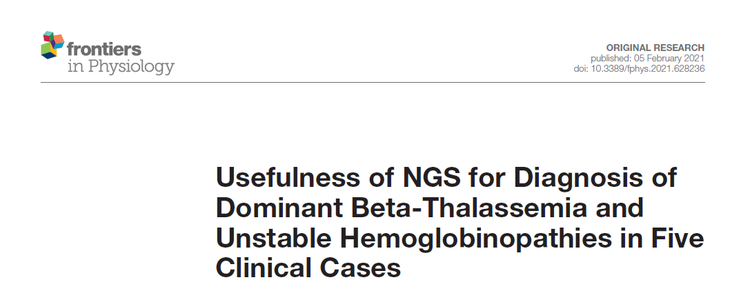The importance of Next Generation Sequencing for the diagnosis of Rare Anemia Disorders

A study under the name “Usefulness of NGS for Diagnosis of Dominant Beta-Thalassemia and Unstable Hemoglobinopathies in Five Clinical Cases” has been recently published. Part of the team is composed by three different ERN-EuroBloodNet members.
Unstable hemoglobinopathies (UHs) are rare anemia disorders (RADs) characterized by abnormal hemoglobin (Hb) variants with decreased stability. Most cases of UHs are not detected by conventional testing, therefore diagnosis requires a high index of suspicion of the treating physician.
"Usefulness of NGS for Diagnosis of Dominant Beta-Thalassemia and Unstable Hemoglobinopathies in Five Clinical Cases", a recently published manuscript generated within the European Reference Network on Rare Hematological Diseases (ERN-EuroBloodNet, FPA 739541) highlights the importance of next generation sequencing (NGS) methodologies for the diagnosis of patients with dBTHAL and other less severe UH variants.
The team is composed by experts from several centres, three of them are ERN-EuroBloodNet members: Valeria Rizzuto (Vall d'Hebron Research Institute, Josep Carreras Leukaemia Research Institute and Universitat de Barcelona), Tamara T. Koopman (Leiden University Medical Center), Adoración Blanco-Álvarez (Hospital Universitari Vall d'Hebron), Barbara Tazón-Vega (Hospital Universitari Vall d'Hebron), Amira Idrizovic (Vall d'Hebron Research Institute), Cristina Díaz de Heredia (Hospital Universitari Vall d'Hebron), Rafael Del Orbe (Hospital Universitario Cruces), Miriam Vara Pampliega (Hospital Universitario Cruces), Pablo Velasco (Hospital Universitari Vall d'Hebron, David Beneitez (Hospital Universitari Vall d'Hebron), Gijs W. E. Santen (Leiden University Medical Center), Quinten Waisfisz (VU Medical Center), Mariet Elting (VU Medical Center), Frans J. W. Smiers (Leiden University Medical Center), Anne J. de Pagter (Leiden University Medical Center), Jean-Louis H. Kerkhoffs (HAGA City Hospital), Cornelis L. Harteveld (Leiden University Medical Center) and Maria del Mar Mañú-Pereira (Vall d'Hebron Research Institute).
The presented study confirms the relevance of including globin genes in next generation sequencing (NGS) approaches for the diagnosis of rare anemia disorders (RADs), especially for cases with no family history in which the anemia is not easily explained.
This work serves to shed light on this topic contributing to the knowledge and better diagnosis of UHs.
